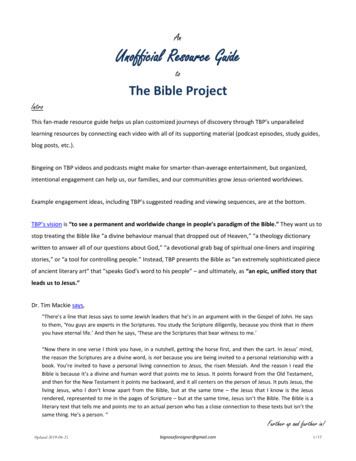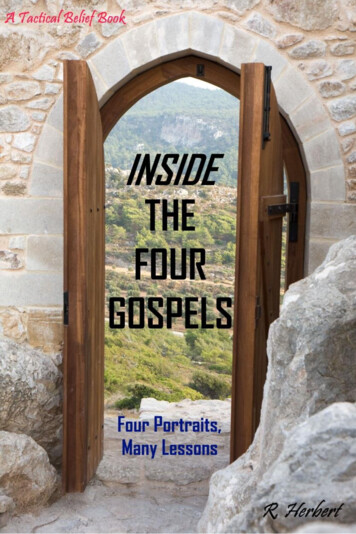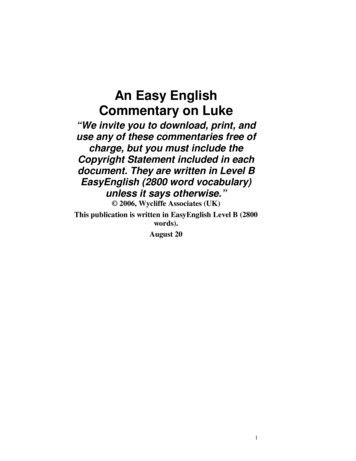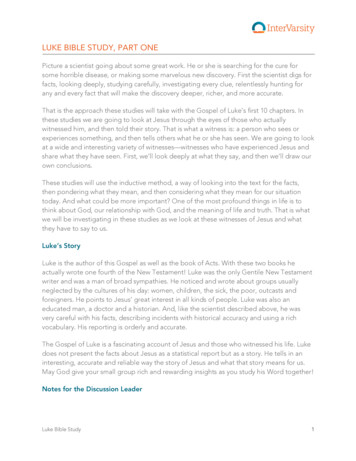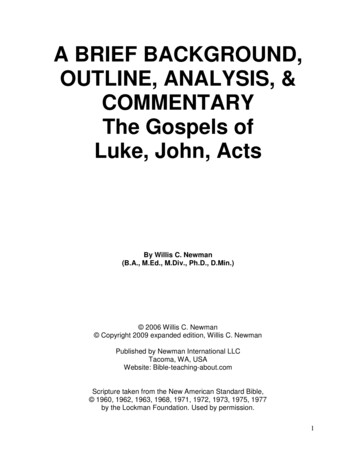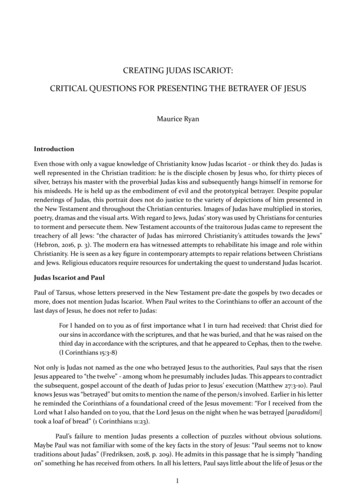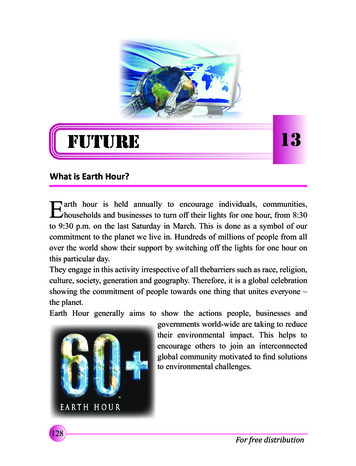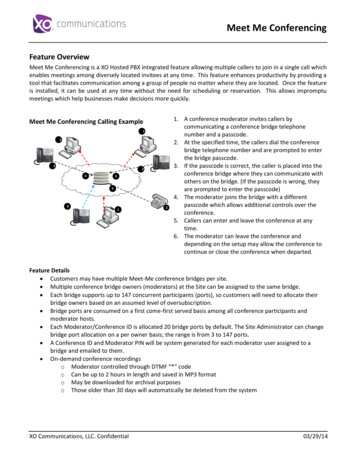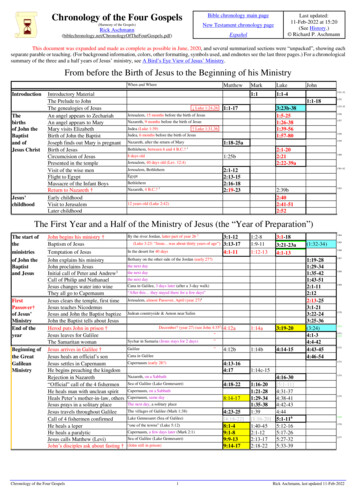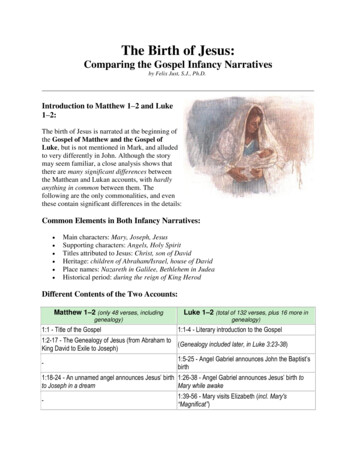
Transcription
INTRODUCTIONMeet Dr. Luke. Luke was the author of both the Gospel of Luke and the Book of Acts. Paul refersto him as "the beloved physician" (Col. 4:14) and one of his "fellow workers" (Philemon 24). He nodoubt ministered to Paul's personal medical needs on his second missionary journey, and during Paul'simprisonment in Rome. He also helped in the work of preaching the gospel. He was the first medicalmissionary. Some scholars think that he was the first minister of the church at Philippi. Just beforePaul's execution by the emperor Nero, Luke is mentioned for the last time in the Bible. Paul says, "onlyLuke is with me" (2 Tim. 4:11). Luke generally is thought to have been a Gentile. Early Christiantradition says that Luke came from Antioch of Syria, that he, like Paul, was single, and that he lived tothe age of 84.Luke's Gospel. Luke wrote his Gospel for a Greek audience. He stresses more than the other threeGospels the humanity of Jesus. His favorite title for Jesus is "Son of man." He draws special attentionto Jesus' concern for outcasts, the poor, children and women. More prayers of Jesus are recorded byLuke than the other Gospel writers.Listed below is an outline of the life of Jesus with the nineteen most important events. Thosemarked with * are described in Luke.A. Preparation Phase: 30 years (Matt. 1:1-4:11; Mark 1:1-11; Luke 1:1-3:21; John 1:1-51).*1. Birth.*2. Temple Visit (age 12).*3. Baptism (age 30).B. Obscurity Phrase: 1 year (Matt. 4:1-11; Mark 1:12-13; Luke 3:21-4:13; John 2:1-4:54).*4. Temptation.5. First Miracle at Cana.6. First Cleansing of Temple.C. Popularity Phase: 1 year (Matt. 4:12-9:35; Mark 1:14-5:43; Luke 4:14-9:17; John 5:5:1-47).*7. Twelve ordained.*8. Two resurrections.*9. Feeding of 5,000.D. Opposition Phase: 1 year (Matt. 9:36-18:35; Mark 6:1-9:50; Luke 9:18-13:21; John 6:1-10:39).10. Feeding of 4,000.*11. Peter's Confession.*12. Transfiguration.*13. Sending forth the 72.E. Persecution Phrase: 3 months (Matt. 19:1-20:34; Mark 10:1-52; Luke 13:22-19:27; John 10:4011:57).*14. Resurrection of Lazarus.F. Final Week (Matt. 21:1-27:66; Mark 11:15-47; Luke 19:28-23:56; John 12:1-19:42).*15. Triumphal Entry.*16. Second Cleansing of Temple.*17. Crucifixion.G. Triumph Phase: 40 days (Matt. 28:1-20; Mark 16:1-20; Luke 24:1-53; John 20:1-21:25).*18. Resurrection.*19. Ascension.PREFACELuke 1:1-4I. Previous Efforts (1:1-2):23
A. Their Number (1:1a): Many have undertaken to draw up an account: When Luke began to writein about AD 60 others had already written accounts of various aspects of the life of Jesus. None ofthem, however, had done what Luke aims to do. Most of those earliest written records of Jesus' lifehave not survived. We do, however, have the Gospel of Matthew, and possibly Mark, which hadalready been written at the time Luke took up the pen.B. Their Subject (1:1b): The things that have been fulfilled among us: For Luke history was noaccident. It was the fulfillment of a divine plan. The coming of Christ had been predicted by theprophets of the Old Testament.C. Their Sources (1:2):1. Eyewitnesses (1:2a): Just as they were handed down to us by those who from the first wereeyewitnesses: Luke was not himself an eyewitness of the events of Jesus' life. He relied on thetestimony of the eyewitnesses. During travels with Paul in Palestine he would have had abundantopportunity to interview those eyewitnesses.2. Original teachers (1:2b): And servants of the word: The eyewitnesses had been willing to pass downto others that of which they had personal knowledge. They preached and taught the word or gospel.II. Luke's Intentions (1:3-4):A. Luke's Investigation (1:3a): I myself have carefully investigated everything from the beginning:Luke wanted his account of Christ's life to be both complete and accurate.B. Luke's Goal (1:3b): An orderly account: Luke aimed to record the events of Christ's life inchronological order.C. Luke's Patron (1:3c): Most excellent Theophilus: The name Theophilus means "lover of God." Heprobably was a wealthy Gentile Christian who provided the money to get the book of Luke published.It is thought that he lived in or near Rome. Luke writes this book with Gentiles like Theophilus inmind.D. Luke's Purpose (1:4): So that you may know the certainty of the things you have been taught:Theophilus already was a believer, but he was in need of further grounding in the truth about Jesus.Many false teachers were twisting the facts of Christ's life. Theophilus need to have accurate factsupon which to build his faith.1PREPARATION FOR THE SAVIORLuke 1:5-4:13AnnunciationsLuke 1:5-56I. Announcement of John's Birth (1:5-25):A. Time of the Announcement (1:5a): In the time of Herod king of Judea: Herod the Great ruledthe Jews from 37-4 BC. He is not to be confused with his son Herod the tetrarch mentioned later inLuke. Though not a Jew himself, Herod had been appointed by the Romans to be the King of the Jews.1Why is it important for us to have accurate information about the life of Jesus? What are someproblems which might arise when members of a church are not well taught about Jesus' life?24
The area in which the Jews lived is called Judea. Herod is the monster who ordered the infants inBethlehem to be killed as recorded by Matthew.B. Recipients of the Announcement (1:5b-7):1. Their ancestry (1:5b): There was a priest named Zechariah, who belonged to the priestly divisionof Abijah. His wife Elizabeth was also a descendant of Aaron: During the days of David the priestshad been organized into 24 divisions (1 Chron 24:1-6). Twice a year each division was on duty in thetemple in Jerusalem for one week. Under the Law of Moses all priests were required to be descendantsof Aaron. The Law did not require a priest to marry a wife of the priestly family, but this wasconsidered a special blessing.22. Their character (1:6): Both of them were upright in the sight of God, observing all the Lord'scommandments and regulations blamelessly: To be upright or righteous means to be obedient to thewill of God. Zechariah and Elizabeth obeyed the rules and regulations of the Law of Moses.33. Their problem (1:7): But they had no children, because Elizabeth was barren; and they were bothwell along in years: A married woman who could not bear children was considered to be under acurse. She was looked down upon by other women. Through the years Elizabeth had endured thissorrow. She and her husband were at the stage of life when, humanly speaking, it was impossible forthem to have children.C. Circumstances of the Announcement (1:8-10):1. On duty at the temple (1:8): Once when Zechariah's division was on duty and he was serving aspriest before God: A priestly division served for one week in the Jerusalem temple twice a year.2. Chosen for special service (1:9): He was chosen by lot, according to the custom of the priesthood,to go into the temple of the Lord and burn incense: The priests would divide the temple duties bycasting lots. This was equivalent to the modern practice of drawing straws. Among the more desirableduties, was entering into the beautiful temple to offer up incense at the golden altar of incense thatstood immediately in front of the curtain which divided the Holy Place from the Holy of Holies. Apriest was only allowed to have this privilege once in his lifetime.3. Engaged in solemn ministry (1:10): And when the time for the burning of incense came, all theassembled worshipers were praying outside: Incense was offered twice a day, in the morning and inmid-afternoon. Worshipers actually did not enter the temple; they remained outside in the vastcourtyards which surrounded the sacred building.4D. Agent of the Announcement (1:11-13a):1. The appearance of an angel (1:11): Then an angel of the Lord appeared to him, standing at theright side of the altar of incense: Angels are ministering spirits. On occasion God permitted them tomaterialize so as to be seen by the eyes of man.2. The reaction of Zechariah (1:12): When Zechariah saw him, he was startled and was gripped withfear: It is natural that the sudden, unexpected appearance of a strong, holy, dazzlingly brilliant angelcaused the old priest to tremble.3. The reassurance of the angel (1:13a): But the angel said to him: Do not be afraid, Zechariah:Often in the Scriptures the Lord or his agents encourage people not to be afraid. This is another way ofsaying, Cheer up! Your prayer has been heard: The angel may be referring to the priestly prayer thatZechariah was making on behalf of God's people at that altar of incense. More likely, however, is theview that Zechariah had throughout his wife been praying for his wife to have his child.2What in this verse suggests that spiritual compatibility is essential to happiness in marriage?Which is more important, reputation in the sight of men, or righteousness in the sight of God? Whatis the difference between the two?4Why is the offering of incense a fitting symbol of prayer? To whom does the privilege of prayerbelong?325
E. Shock of the Announcement (1:13b-14):1. Mother of the child (1:13b): Your wife Elizabeth will bear you a son : Even the sex of the child isforetold.2. Name of the child (1:13c): and you are to give him the name John. The naming of a child by aheavenly messenger hints at the importance of this child in the program of God.3. Joy over the child (1:14): He will be a joy and delight to you, and many will rejoice because of hisbirth: The child would bring joy to his parents of course. His birth would be the occasion of joy amongall the friends and relatives of the couple. Later on, when John became the powerful prophet of God,people would rejoice over the fact that he had been born.F. Significance of the Announcement (1:15-17):1. John’s devoted personal life (1:15):a. He would become great (1:15a): For he will be great in the sight of the Lord: Jesus once said ofJohn: "Among those born of women there has not arisen anyone greater than John the Baptist" (Matt11:11). Years after his dead, John still had followers all over the Roman empire.b. He would be a Nazarite (1:15b): He is never to take wine or other fermented drink: John was to bea Nazarite for life. Nazarites were never to drink wine or eat any fruit of the vine. As an outwardsymbol of their commitment, Nazarites did not cut their hair.c. He would be filled with the Spirit (1:15c): And he will be filled with the Holy Spirit even frombirth: From the very beginning of his life John would be filled with the Holy Spirit. Those who werefilled with the Spirit demonstrate extraordinary courage and dedication.52. John’s vital ministry (1:16): Many of the people of Israel will he bring back to the Lord their God:The mission of John was to bring the Lord's people back to their God. This he did by strong preachingon repentance.3. John’s fulfillment of prophecy (1:17):a. His model (1:17a): And he will go on before the Lord, in the spirit and power of Elijah to turn thehearts of the fathers to their children, and the disobedient to the wisdom of the righteous: Malachihad predicted that God would send Elijah to Israel (Mal 4:5-6). John was that "Elijah" (Matt. 11:1314). He displayed the boldness and powerful preaching of the famous Elijah. John's mission was toprepare the way for the coming of the Lord, i.e., Jesus John's preaching would result in the conversionof sinners. This would result in harmony between parents and their children. To obey God's Word is amanifestation of wisdom. Righteous people are those who are obedient to God's Word.b. His work (1:17b): To make ready a people prepared for the Lord: The end result of John's ministrywould be to present to the Lord a people ready to be used by him.6G. Reaction to the Announcement (1:18-20):1. Zechariah's implicit doubt (1:18): Zechariah asked the angel, How can I be sure of this? I am anold man and my wife is well along in years. Zechariah did not believe the angel. There is no excusefor his unbelief. The Old Testament is full of examples of spectacular miracles performed for barrencouples.2. The angel's implicit rebuke (1:19): The angel answered, I am Gabriel. I stand in the presence ofGod, and I have been sent to speak to you and to tell you this good news: Gabriel is mentioned alsoin Dan. 8:16. The only other angel mentioned by name in Scripture is Michael (Dan 10:13). Gabrielseems to have had the special mission of bringing God's messages to human beings, and interpretingthose messages. Gabriel knew whereof he spoke. His prediction was sure. God would cause this barrencouple to have a baby.3. Zechariah's explicit punishment (1:20): And now you will be silent and not able to speak until theday this happens, because you did not believe my words, which will come true at their proper time:5Why did God forbid Nazarites to drink wine? What was the source of John's energy and boldness?6How does true conversion remove the generation gap in a family?26
Zechariah would be punished for not believing the Word of God. However, God still loved the oldpriest. His speech would be restored when the child was born and then named by his father.7H. Aftermath of the Announcement (1:21-25):1. In respect to the people (1:21-22a):a. Concern of the people (1:21): Meanwhile, the people were waiting for Zechariah and wonderingwhy he stayed so long in the temple. The priests would normally leave the incense altar as quickly aspossible, lest he commit some unholy act while at that temple. The worshipers outside in the courtyardcould not understand why it was taking the priest so long to complete his work.b. Realization of the people (1:22a): When he came out, he could not speak to them. They realized hehad seen a vision in the temple 2. In respect to Zechariah (1:22b-23):a. He tried to communicate to the people (1:22b0: for he kept making signs to them but remainedunable to speak. Gabriel's prediction about Zechariah had come to pass. By means of signs heindicated that he had seen a vision in the temple.b. He returned home (1:23): When his time of service was completed, he returned home. Zechariahreturned to his wife at the end of his week of service at the temple.3. In respect to Elizabeth (1:24-25):a. She became pregnant (1:24a): After this his wife Elizabeth became pregnant God's promisesnever fail! Like Sarah, Rebekah and Rachel, Elizabeth conceived after long years of barrenness.b. She remained in seclusion (1:24b): and for five months remained in seclusion. The text does notsay why she remained in seclusion for five months. Perhaps she was taking extra precaution againstmiscarriage. She rested at home rather than pursue her normal work.c. She gave God the glory (1:25): The Lord has done this for me, she said. In these days he hasshown his favor and taken away my disgrace among the people. Elizabeth openly gives God thecredit for her pregnancy. She regarded this as a special manifestation of God's favor.8II. Announcement of Jesus' Birth (1:26-38):A. Circumstances (1:26-27):1. Time and place (1:26): In the sixth month, God sent the angel Gabriel to Nazareth, a town inGalilee: It was the sixth month of Elizabeth's pregnancy. Nazareth was a village in the hills of Galilee,15 miles from the sea of Galilee to the east, and 22 miles from the Mediterranean Sea to the west.2. Recipient (1:27): To a virgin pledged to be married to a man named Joseph, a descendant ofDavid. The virgin's name was Mary: Both Mary, and her fiancée, lived in Nazareth. Both weredescendants of the great King David. For almost 600 years no one from the royal family of David hadruled over the Jews. Engagement in Bible days was taken more seriously than today. Even though thecouple did not live together, the woman was already considered the wife of the man. This Mary mustbe distinguished from three other Marys in our text this year: (1) Mary the mother of John Mark (Acts12:12); (2) Mary of Bethany (Lk 10:42); and (3) Mary Magdalene (Lk 8:2).9B. Greeting (1:28-30):1. The angel's bold address (1:28): The angel went to her and said, Greetings, you who are highlyfavored! The Lord is with you: The angel must have entered by the door, like a friend or relative.7Do Christians today know the promises which God's Word contains for them? Do they believe thosepromises?8Should we as believers merely count our blessings, or should we trace them back to the Giver? Canone experience true thanksgiving would recognizing God?9Why did God choose Mary to be the mother of Messiah? Why is it important to remain sexually pureprior to marriage?27
After the traditional greetings, the angel announces Mary was highly favored, i.e., chosen above everyother woman in the world. God was with her in a very special way.2. Mary's puzzlement (1:29): Mary was greatly troubled at his words and wondered what kind ofgreeting this might be: It was not the sudden appearance of the stranger nor his appearance thatfrightened Mary; it was his words. She knew she was a woman of lowly social position, and she didnot she how it was possible that she could be addressed in such lofty terms.3. The angel's comforting assurance (1:30): But the angel said to her, Do not be afraid, Mary, youhave found favor with God: As in the case of Zechariah (v. 13) Mary was told not to be afraid. Mary'spure life had pleased God.C. Prediction (1:31-33):1. Prediction regarding Mary (1:31): You will be with child and give birth to a son, and you are togive him the name Jesus: Mary had been chosen to be mother of the Messiah. Mary was told what thechild's name would be. Joseph was also given instructions by an angel concerning the naming of thechild (Matt 1:21). The name Jesus means "the Lord saves." The child was given this name because hewould save his people from their sins (Matt 1:21).2. Predictions about Jesus (1:32):a. His title (1:32a): He will be great and will be called the Son of the Most High: The greatness ofJesus cannot be questioned even by those who do not believe in him as savior. Because of the uniquecircumstances of his birth, his life, his death and his resurrection Jesus would come to be recognized asdivine. The title Most High in reference to God appears five additional times in the text (Lk 1:35,76;6:35; 8:28; Acts 7:48).b. His throne (1:32b): The Lord God will give him the throne of his father David: The prophecy bythe prophet Nathan in 2 Samuel 7:11-13 would find its complete fulfillment in Jesus. Christ would siton the throne once occupied by his ancestor David.3. Prediction about Jesus’ kingdom (1:33): And he will reign over the house of Jacob forever; hiskingdom will never end: The throne of David was in reality God's throne (1 Chron 29:23). When heascended into heaven, Jesus was seated on God's throne. There he will sit enthroned forever. Hiskingdom is eternal. The New Testament house of Jacob includes Gentiles as well as Jews who havesurrendered their lives to the Lord Jesus.D. Explanation (1:34-35):1. Mary's request (1:34): How will this be, Mary asked the angel, since I am a virgin?: UnlikeZechariah, Mary believed the angel. She simply was perplexed by his predictions. She correctlyunderstood him to be saying that in her status as a virgin she would bear a son. A virgin woman is onewho has not slept with a man. By human standards it would not be possible for such a woman to bear achild without the seed of the man within her.2. Gabriel's response (1:35):a. Explanation of the pregnancy (1:35a): The angel answered, The Holy Spirit will come upon you,and the power of the Most High will overshadow you: The angel makes clear that Mary's pregnancywill result from divine, not human, action. The Holy Spirit would bring about the miracle in Mary'swomb by exerting his divine power.b. Explanation of the child's title (1:35b): So the holy one to be born will be called the Son of God: Astime went on, people would come to realize that Joseph was not, nor could he have been, the father ofJesus. Jesus was the eternal Word of God who came into the world through Mary (John 1:14). Theconception of the child was miraculous; his birth, however, was normal.10E. Encouragement (1:36-37):10In what ways does v. 35 suggest that Jesus was qualified to be our Savior?28
1. Encouragement of Elizabeth's pregnancy (1:36): Even Elizabeth your relative is going to have achild in her old age, and she who was said to be barren is in her sixth month: In order to strengthenMary's faith, the angel calls attention to the miracle of the conception of the barren Elizabeth. Herconception was miraculous, but it was not unique. Others in Bible history had conceived in their oldage. Mary's conception, however, was unique. Jesus is the only one to have been born of a virgin.Apparently to this point the pregnancy of Elizabeth had not been made public. This verse establishesthat John the Baptist was six months older than Jesus. How could Elizabeth be a relative of Mary?Mary was of the house of David, the tribe of Judah. Elizabeth was of the house of Aaron, the tribe ofLevi (see. v. 5). The answer is this: Ancestry was traced through one's father. Elizabeth's mother mayhave been from the tribe of Judah.2. Encouragement of God's power (1:37): For nothing is impossible with God: He was able to bringabout the pregnancy of Elizabeth; He would also be able to fulfill his promises to Mary.F. Submission (1:38): I am the Lord's servant, Mary answered. May it be to me as you have said.Mary knew that becoming pregnant before marriage to Joseph could cost her painful criticism, abroken engagement, and possibly even death (Deut 22:23f.). But she completely surrendered herself tothe will of the Lord. Then the angel left her: His mission completed, Gabriel departed from Mary.III. Celebration of Pregnancy (1:39-56):A. Elizabeth’s Blessing (1:39-45):1. Circumstances (1:39-41):a. Mary's visit to Elizabeth (1:39): At that time Mary got ready and hurried to a town in the hillcountry of Judah: Mary needed someone with whom she could confide. She also wished tocongratulate her relative on her pregnancy. Luke does not identify the particular town in the hillcountry of Judah where Zechariah and Elizabeth lived. On donkey the trip would have been long anddifficult. She probably traveled in the company of a caravan of locals who were making their way tothe south on business or to attend some temple festival.b. Mary's greeting to Elizabeth (1:40): Where she entered Zechariah's home and greeted Elizabeth:The greeting consisted of a warm embrace accompanied by a few loving words.c. Movement of the child (1:41): When Elizabeth heard Mary's greeting, the baby leaped in herwomb, and Elizabeth was fill with the Holy Spirit: In the sixth month of pregnancy a suddenmovement of the unborn baby would not have been considered unusual. In this case, however, theHoly Spirit revealed to Elizabeth something more. See on v. 44.2. Elizabeth's double blessing (1:42): In a loud voice she exclaimed: Blessed are you among women,and blessed is the child you will bear!: Blessed means happy. Among all women on earth, Mary wasthe most blessed, because she had been chosen by the Lord to be mother of the Messiah. The languageshows that Mary was already pregnant at the time of this visit. The child, as well as the mother, is theobject of God's special delight.3. Elizabeth's recognition (1:43-44):a. She recognized the child as her Lord (1:43): But why am I so favored, that the mother of my Lordshould come to me?: At this point Elizabeth sees in Mary more than a mere relative. Through thepower of the Holy Spirit, Elizabeth knew that Mary was pregnant, and that the child she would bearwould be the Lord.11b. Reason she recognized the child (1:44): As soon as the sound of your greeting reached my ears, thebaby in my womb leaped for joy: Elizabeth was enlightened by the Holy Spirit to interpret the baby'smovement as an expression of the joy experienced by the unborn child.11Catholics virtually worship Mary. Of course this is wrong. But do we give Mary the respect that is due her asthe chosen vessel of the Lord?29
4. Elizabeth's blessing on Mary (1:45): Blessed is she who has believed that what the Lord has said toher will be accomplished!: Here the Holy Spirit reveals to Elizabeth what had been Mary's reaction tothe visit of the angel in v. 38. At this point the unique already had taken place. Yet to be fulfilled werethe promises concerning the birth, name, nature and rule of the child in her womb.12B. Mary's Song (1:46-56). [Known as the Magnificat, because of the first word in the Latin version]1. Mary's joy in her Lord (1:46-49a):a. Affirmations of joy (1:46-47): And Mary said: My soul praises the Lord, 47 and my spirit rejoicesin God my Savior: Mary's heart is filled to overflowing with thanksgiving for that which God had donefor her. She enthusiastically and joyfully proclaims the greatness of the Lord. Though a pure youngwoman, Mary needed a Savior just like every other sinner.b. Explanations of joy (1:48-49):(1) God had honored Mary (1:48): For he has been mindful of the humble state of his servant. Fromnow on all generations will call me blessed: Mary was deeply conscience that she was of a poorfamily, engaged to the village carpenter. She was not a likely candidate to be chosen as the object ofGod's special favor. People of future generations would regard Mary as blessed to be used of God tobring this child into the world. She does not mean that people through the centuries would regard heras an intermediary between man and Jesus, or that people would regard her as an object of veneration.She means that all generations would praise God because of the marvelous manner in which Hehonored this humble maiden.(2) God demonstrated his power to Mary (1:49a): For the Mighty One has done great things for me:Mary praises God's power. The title Mighty One recognizes God as the one who specializes in theimpossible. The conception within the womb of this virgin is the latest, and perhaps greatest to date,manifestation of divine power.2. Mary's praise for the Lord (1:49b-55):a. Praise for God's holiness (1:49b): Holy is his name. Holy means set apart from the world. God'sname is always to be honored.13b. Praise for God's mercy (1:50): His mercy extends to those who fear him, from generation togeneration: Having praised God's power, and holiness, Mary next extols God's mercy. The samemercy that God had shown to her individually would be available to those who fear the Lord in allfuture generations. To fear God is to reverence him, to believe in him, to obey him.c. Praise for God's record (1:51-55):(1) Scattered the proud (1:51): He has performed mighty deeds with his arm; he has scattered thosewho are proud in their inmost thoughts: Mary recognized that God had a history of great deeds to hiscredit. The arm is a symbol of the power of God. God is a Spirit; He does not have a human body. Theproud are those who do not fear God. From her knowledge of Scripture, Mary knew of many exampleswhere God had dispersed and thus brought to nothing the designs of arrogant men.(2) Changed rulers (1:52): He has brought down rulers from their thrones but has lifted up thehumble. The Old Testament is full of examples of rulers placed on their thrones and removed therefrom by God. The greatest powers on earth are subject to the greater power of God! Yet Scripturefurnishes many examples of how God raised up humble people to positions of power and prominence.The humble are those who fear God.(3) Reversed human circumstances (1:53): He has filled the hungry with good things but has sent therich away empty. The hungry may be those physically hungry, or those who hunger after spiritualthings. While the hungry are filled, the rich and powerful often lose everything they have. Basicthought: God cares for his own.14121314What did Mary believe? How great was her faith? How did Elizabeth know that Mary believed?God had done great things for Mary. What great things has He done for us?In what sense are the wicked rich empty even before they are dispatched into eternity?30
(4) Helped Israel (1:54-55): He has helped his servant Israel, remembering to be merciful: 55 ToAbraham and his descendants forever, even as he said to our fathers. The nation Israel was God'sservant. Time and again God had rendered Israel help against their enemies. He was merciful to hispeople, even when they were undeserving. Now he is about to help his people again, by bringingMessiah into the world. God had promised that through Abraham, Isaac and Jacob all the families ofthe earth would be blessed. Mary views what is happening to her as the fulfillment of those promisesmade centuries earlier to the Patriarchs.3. Conclusion (1:56): Mary stayed with Elizabeth for about three months and then returned home:Mary must have stayed with Elizabeth until the birth of John, or thereabouts. Mary's home was inNazareth. During those three months an angel had appeared to Joseph directing him to marry Maryeven though she was pregnant before the marriage (Matt 1:18-24).BirthsLuke 1:57-2:40I. Birth of John (1:57-80):A. Celebration of the Birth (1:57-59a):1. Joy of Elizabeth (1:57): When it was time for Elizabeth to have her baby, she gave birth to a son:The prediction that Elizabeth would give birth to a male child has now been fulfilled.2. Joy of Friends (1:58): Her neighbors and relatives heard that the Lord had shown her greatmercy, and they shared her joy: Near-by neighbors and relatives from more distant places came tocongratulate Zechariah and Elizabeth and share in their joy. Mercy refers to the granting of birth to abarren couple.15B. Issue of the Name (1:59-63):1. Circumstances (1:59a): On the eighth day they came to circumcise the child: Circumcision is aminor surgery performed on the private part of a male infant. The Law of Moses prescribed that thiswas to be done on the eighth day of life (Gen 17:13; Lev 12:3). Circumcision was a mark of thecovenant God had made with Abraham centuries earlier. The surgery was probably performed by arabbi or p
Paul's execution by the emperor Nero, Luke is mentioned for the last time in the Bible. Paul says, "only Luke is with me" (2 Tim. 4:11). Luke generally is thought to have been a Gentile. Early Christian tradition says that Luke came from Antioch of Syria, that he, like Paul, was single, and that he lived to the age of 84. Luke's Gospel.
